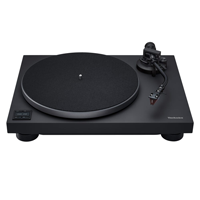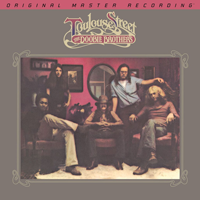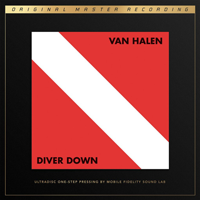This past weekend was beautiful in Chicago. Both days, temps hit the mid-70s. Sunday, I spent the day in the backyard and discovered one of the best things about working from home: Working outside. I played music all afternoon and took my laptop along to do a little writing. I know, working on a gorgeous Sunday sounds strange, but as the saying goes, there is no rest for the wicked.
I started the day by listening to some of my favorite live albums. First, I cued up Van Morrison's It's Too Late to Stop Now. Van is such an incredible soul singer, and his backup band in 1973, which he called the Caledonia Soul Orchestra, was tremendous. I also listened to some live Simon and Garfunkel, Live from New York City, 1967, and Live 1969. Both incredible performances were recorded when the duo was in its prime. And then I was thinking about playing Joni Mitchell's Miles of Aisles or Neil Young's Live at Massey Hall, or a great live soul record like Bill Withers' heartwarming Live at Carnegie Hall. But then I was drawn to one of my very favorite live LPs, The Last Waltz.
The Band's 3LP set has given me much pleasure over the course of my life. I've watched the concert film dozens of times, including seeing it played in large theaters in college and more recently here in Chicago. Martin Scorsese did an amazing job of capturing one of the most important and influential rock bands in history. The film captivates for many reasons. The interviews are illuminating. So, too, are the weathered and weary faces on the performers. Indeed, while the female artists all look stunning, many of the gentlemen look like the road had not been too kind. When Robbie Robertson says he and his mates had been on the road for 17 years, and he didn't think he could handle getting to 20, you could see in his weary eyes that he meant it.
When I talk about my love for The Last Waltz, it always brings up differing opinions from music writers, industry professionals, and music lovers. I like to imagine everyone has already read both Levon Helm's autobiography, This Wheel's on Fire, as well as the newer Robbie book, Testimony, which was just tuned into a film, Once Were Brothers. They are both great books, and well worth the read.
I don't want to delve into detail about everyone's impressions of the concert film. Or who wrote which songs, who got songwriting credit, and who didn't. Nor do I want to write about whose drug use got the better of them, or who snorted every last penny of their royalty money. Was the film shot from Robbie's perspective? Yes. Was it filmed in a way that made it look like Robbie was the leader of The Band? Yes.
I'm going to bottom-line my personal impressions of the The Last Waltz LP and film: I love The Band. I love Robbie. His songwriting, and especially, his guitar playing. I love Levon. And Richard Manuel. And Rick Danko. And Garth Hudson, too. I love all the performances, especially from the special guests, as The Band plays back-up for the decades' most famous singer/songwriters. And I love seeing the performances through Scorsese's lens. This film of the group's final performance on Thanksgiving night 1976 at San Francisco's Winterland Ballroom is one of the ages. And no one or nothing is going to change my mind about its importance and musical merit.
But today is not for debate. And I'm not writing about the film. I'm playing the record. Every single performance on the LP is pure gold. And the special guests: holy crap. I don't think there has ever been such rock royalty assembled for a concert. Bob Dylan, Dr. John, Neil Young, Joni Mitchell, Van Morrison, Eric Clapton, the Staple Singers, Emmylou Harris, Muddy Waters, Paul Butterfield, and more. I like to think that everyone felt as Neil did when he said it was one of the pleasures of his life to be on that stage.
Today, I am spinning my Japanese 1st pressing. The dead-quiet surfaces drew me to it, and I played the whole album, all six sides, while sitting outside on my porch. I have a turntable downstairs connected to my whole-house audio system, so the two speakers on my deck were blasting the great music.
Just consider The Band's singing. Three lead singers, all with such different-sounding voices, allowed the group to paint its canvasses with multiple hues. Levon's southern, gravelly voice remains unmatched in its honesty and purity. Danko's fragile vocals brim with emotion and unique venerability. And Manuel had a remarkable voice, simultaneously teeming with both strength and fragility, heard clearly in his rendition of "The Shape I'm In." Check out the look in his eyes next time you watch the film.
Of course, all were such great players, too. And the songwriting quality is off the charts. Many of rock's royalty have stated Music from Big Pink and the self-titled second album, The Band, changed their approach to making music. The Band was influential to so many different musicians of varying styles, both 50 years ago as well as today.
Back to specifics from The Last Waltz. The album's versions of "Up on Cripple Creek," "The Night they Drove Old Dixie Down," "Stagefright," and "The Weight" are spectacular. Mavis Staples' verse in "The Weight" is the main reason it is one of my all-time favorite performances, and one that shoots an arrow straight through my heart. It is among her most emotional, most expressive performances from her stunning six-decade-long career.
On that topic, all of the guest performances are all mind-blowing. The versions of Mitchell's "Coyote," Dr. John's "Such a Night," Van the Man's "Caravan," and Dylan's "Forever Young" are the best renditions of these songs on record. And no matter how many times I hear (or see) Neil's performance of "Helpless," with Joni singing background from behind the stage, a tear rolls down my face. These performances are all so well executed, and The Band just sits in, playing backup to all these stars. Everything fits together perfectly.
The Last Waltz captures an incredible band at its best after many years of traveling the world and appreciating the excesses provided by that lifestyle. It also represents a place in time when rock 'n roll was energized by more than just the white lines Joni sings about unapologetically in "Coyote." Everyone was influencing each other. The artist community was generous as well as competitive. Great music fueled more music, and songwriting clearly defined the decade. One of the most fertile periods of popular music was coming to an end and everyone in attendance that night seemed thrilled to be on that stage, paying tribute to The Band. As far as last waltzes go, this one is legendary.
4th May 2020




































